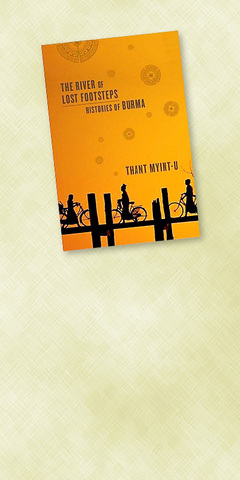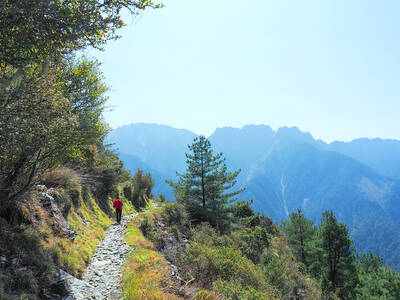Myanmar has the dubious distinction of playing host to the world's longest-running civil war — it began with independence in 1948 and still goes on — and its most durable military dictatorship. If not for North Korea, Burma might also claim top honors in two other categories — most isolated and most xenophobic — but it could still win the prize for most misunderstood.
Geographically remote, politically retrograde, economically backward, Burma, today called Myanmar, struggles on, burdened by one of the largest armies on the planet and desperate for help. In The River of Lost Footstep, Thant Myint-U offers at least a little understanding, "an introduction to a country whose current problems are increasingly known but whose colorful and vibrant history is almost entirely forgotten."
Thant looks at Myanmar from an unusual vantage point. His maternal grandfather, U Thant, who served as secretary-general of the UN in the 1960s, belonged to the first generation of Burmese nationalists who assumed control of the government after the British left in 1948.

Throughout the author's childhood, spent in New York, notable figures from the Burmese anti-colonial movement and the military government of General Ne Win paid visits to the family residence. The River of Lost Footsteps is therefore, in its later chapters, a kind of family history, made even more personal in the years after 1988, when the author became involved in the fledgling Burmese democracy movement
Part history, part memoir, part polemic, with a little travelogue thrown in, The River of Lost Footsteps begins at the beginning of all the troubles: the overthrow of the last royal dynasty in 1885, and the absorption of Burma into British-ruled India. Typically, Burma never even counted as a principal actor in the unfolding dream of empire. It was a sideshow, an afterthought, destined by geography to be a footnote to India or China.
Myanmar's junior status would be a recurrent theme to the present day. "To the extent that it was thought about at all, it had the image of an exotic and dreamy backwater, a gentle Buddhist country, lost in time and quietly isolated, hardly the sort of location for a foreign policy crisis," Thant writes. He refers to the international response to the democracy movement of 1988, but the quotation could be applied to Burmese events at any time over the last several centuries.
The Burmese, of course, have always seen things differently. Thant, after setting the stage for the takeover by the British, tries to put the Burmese point of view back into the picture by retelling their history, in the hope that it might explain their present predicament. Thant, who wrote his doctoral dissertation at Cambridge on 19th-century Burmese history, does not tell the back story well.
His narrative is choppy and often hard to follow. It feels dutiful, and never really regains momentum until the British re-enter, but several important points do come across. The Burmese, who conquered all of present-day Laos and Thailand in the 16th century, regarded themselves as a great conquering race and their military as a source of national pride.
It was Burmese military hubris that led to the first war between Burma and Britain, from 1824 to 1826, a disaster for the Burmese. National pride made the Raj period doubly humiliating. It was bad enough to endure the slights and the snubs, especially for the educated class that revered British culture and the British political system, but to be nothing more than a minor Indian province was truly upsetting.
U Thant, first Burmese member of the Left Book Club, fervent admirer of the Labor politician Stafford Cripps, makes an ideal symbol for his grandson's sensitive reading of the Raj period. An elite that might have furthered British aims was systematically alienated and insulted.
The British, generalizing from their experience with the Gurkhas of Nepal, recruited their army from the mountainous tribal regions. The Burmese, mighty warriors in their own mind, were dismissed as insufficiently martial — childlike and lazy in fact. "It was a policy choice that rankled deeply in the Burmese imagination, eating away at their sense of pride and turning the idea of a Burmese army into a central element of the nationalist dream," Thant writes.
The closer he draws to the present, the more spirited Thant becomes. He has an understated, British sense of humor (Ne Win is introduced as "playboy, tyrant, numerologist and onetime post office clerk") and a subversive attraction to strange details that might not necessarily advance his story but most certainly ornament it.
He gives the ingredients for the house cocktail served at the Pegu Club in Rangoon, and notes that Rudyard Kipling never got anywhere near Mandalay. One would love to hear more about the mysterious, if irrelevant, Olive Yang, described by Thant as a "bisexual warlady" who developed a tough reputation while still at convent school, where she was rumored to carry a revolver in her handbag. Thant needs to release his inner Paul Theroux more often.
Burmese independence came, of course, as an afterthought to India's -- yet another insult dealt by history. Almost nothing has gone right since. Civil war, the military takeover of the government and a ruinous attempt to create a unique brand of Burmese socialism have brought Burma to its knees.
Thant eloquently and mournfully recites the dismal history of the last half century and, in analyzing the country's nascent democracy movement, holds out only the slimmest of hopes for a better future. It will not come through economic and diplomatic sanctions, of that he is convinced. Trade and more engagement, especially more tourism, might let in badly needed light and air. But trying to topple the regime by isolating it would, he argues, be disastrous.
"Much more than any part of Burmese society," he writes, "the army will weather another 40 years of isolation just fine."

“Why does Taiwan identity decline?”a group of researchers lead by University of Nevada political scientist Austin Wang (王宏恩) asked in a recent paper. After all, it is not difficult to explain the rise in Taiwanese identity after the early 1990s. But no model predicted its decline during the 2016-2018 period, they say. After testing various alternative explanations, Wang et al argue that the fall-off in Taiwanese identity during that period is related to voter hedging based on the performance of the Democratic Progressive Party (DPP). Since the DPP is perceived as the guardian of Taiwan identity, when it performs well,

The Taiwan People’s Party (TPP) on May 18 held a rally in Taichung to mark the anniversary of President William Lai’s (賴清德) inauguration on May 20. The title of the rally could be loosely translated to “May 18 recall fraudulent goods” (518退貨ㄌㄨㄚˋ!). Unlike in English, where the terms are the same, “recall” (退貨) in this context refers to product recalls due to damaged, defective or fraudulent merchandise, not the political recalls (罷免) currently dominating the headlines. I attended the rally to determine if the impression was correct that the TPP under party Chairman Huang Kuo-Chang (黃國昌) had little of a

At Computex 2025, Nvidia CEO Jensen Huang (黃仁勳) urged the government to subsidize AI. “All schools in Taiwan must integrate AI into their curricula,” he declared. A few months earlier, he said, “If I were a student today, I’d immediately start using tools like ChatGPT, Gemini Pro and Grok to learn, write and accelerate my thinking.” Huang sees the AI-bullet train leaving the station. And as one of its drivers, he’s worried about youth not getting on board — bad for their careers, and bad for his workforce. As a semiconductor supply-chain powerhouse and AI hub wannabe, Taiwan is seeing

Jade Mountain (玉山) — Taiwan’s highest peak — is the ultimate goal for those attempting a through-hike of the Mountains to Sea National Greenway (山海圳國家綠道), and that’s precisely where we’re headed in this final installment of a quartet of articles covering the Greenway. Picking up the trail at the Tsou tribal villages of Dabang and Tefuye, it’s worth stocking up on provisions before setting off, since — aside from the scant offerings available on the mountain’s Dongpu Lodge (東埔山莊) and Paiyun Lodge’s (排雲山莊) meal service — there’s nowhere to get food from here on out. TEFUYE HISTORIC TRAIL The journey recommences with